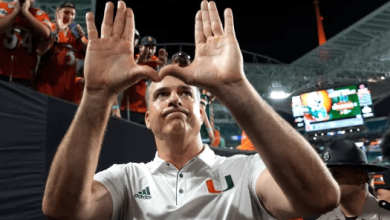The Georgia Bulldogs offensive lineman explains the true cause of the sincere animosity toward Ohio State.

The rivalry between the University of Georgia Bulldogs and the Ohio State Buckeyes has been an intense one, albeit with fewer historical meetings than some other college football rivalries. Despite this, a deeper and more personal animosity has been brewing, particularly among certain players. Georgia’s offensive line, an integral component of the team, has become a focal point for this growing disdain, with emotions running high. Tate Ratledge, a former offensive lineman for Georgia, recently shared his strong feelings about Ohio State, shedding light on the true reasons behind the rivalry. These reasons go beyond just competition on the football field and into the realm of family traditions, regional pride, cultural clashes, and a series of memorable encounters that have fueled this genuine hatred.
The Origins of the Rivalry
To understand the reasons behind the deep-seated hatred that some Georgia players feel toward Ohio State, it is essential to examine the origins of the rivalry. Historically, the Bulldogs and Buckeyes have not faced off frequently. The most high-profile encounter occurred during the 2022 College Football Playoff (CFP) semifinal, when Georgia narrowly defeated Ohio State 42-41 in a game that became a turning point for both teams. However, this single contest, while crucial, cannot fully explain the intensity of the emotions that players like Ratledge have expressed toward Ohio State.
This rivalry, like many in college football, is not just born out of one specific game or even a series of games. It is fueled by a mixture of regional pride, the competitive nature of the two conferences, and, most importantly, the culture of college football itself. The Southeastern Conference (SEC), of which Georgia is a member, has long prided itself on its physicality, its dominance in recruiting, and its ability to produce NFL-ready talent. Ohio State, representing the Big Ten Conference, carries a similar sense of self-assurance, which can often come across as cocky to fans and players of opposing teams. These two powerhouses clash not only on the field but in their identities as programs.
Tate Ratledge’s Perspective
Tate Ratledge, who played for Georgia as an offensive lineman, is one of the players who has vocalized his hatred for Ohio State. In an interview on the “Mullets on the Mic” podcast, Ratledge did not hold back when discussing his feelings toward the Buckeyes. He stated, “I hate Ohio State with everything in me. I hate them. I always have and I always will hate Ohio State.” These blunt remarks were not simply the result of a recent loss or a heated exchange during a game. Instead, they reflect a deeper, more personal reason for Ratledge’s feelings.
Ratledge went on to explain that his hatred toward Ohio State is rooted in his family’s longstanding animosity toward the Buckeyes. He described how his family has “always hated them,” further explaining that his personal experiences only intensified those feelings. This familial influence plays a critical role in shaping how many players view their opponents, as college football rivalries are often passed down through generations. It’s not just about the current state of the program or the history of games played; it’s about tradition, values, and pride. Ratledge’s personal history with Ohio State, shaped by his family’s sentiment, highlights how regional rivalries are often more than just sports—they are deeply entrenched in cultural and familial contexts.
The Family Connection
Ratledge’s remarks about his family’s involvement in the rivalry are not unique. College football is, after all, a sport where fans often identify with their teams in ways that go beyond mere fandom. For many, being a fan of a college football team is a family tradition that spans decades. Fathers pass down their love for their teams to their sons, and these rivalries become a way of life. In Ratledge’s case, his family’s dislike of Ohio State goes back years, making it more than just a personal vendetta—it’s a generational sentiment.
This connection between family and rivalry is not unique to Georgia and Ohio State; many college football rivalries have similar roots. Take, for example, the intense rivalry between Alabama and Auburn, or Michigan and Ohio State. These rivalries have become more than just games; they represent an identity and a source of pride for entire communities. Similarly, Georgia’s disdain for Ohio State is deeply personal, fueled not just by a few games but by the values and traditions passed down within Ratledge’s family.
The Cultural Clash
In addition to personal and familial factors, the rivalry between Georgia and Ohio State is exacerbated by a cultural clash. Ratledge’s criticism of Ohio State fans for their “cocky” attitude is reflective of a larger cultural divide that exists between teams from the Southeastern Conference and those from the Big Ten. SEC fans are known for their passionate support of their teams, often with a focus on the physicality and toughness that the league is known for. The Big Ten, with its storied programs like Ohio State, Michigan, and Penn State, has a different sense of pride. Big Ten fans often pride themselves on tradition, academic excellence, and a storied history of success. For players like Ratledge, this difference in cultural attitudes creates a sense of rivalry that goes beyond the football field.
Ohio State’s use of “The Ohio State University” is another point of contention for Ratledge. The inclusion of “The” in the name of the school is often seen as an indication of the Buckeyes’ self-importance and pride, and this can rub rival fans the wrong way. Ratledge’s distaste for this practice exemplifies how small differences in cultural identity can fuel bigger rivalries. To many SEC fans, Ohio State’s branding feels elitist, a quality they find off-putting in the context of a sport that values blue-collar toughness.
The 2022 College Football Playoff: The Turning Point
While the Georgia-Ohio State rivalry has been fueled by personal, familial, and cultural factors, it was the 2022 College Football Playoff semifinal that brought the rivalry to a head. The game, played on New Year’s Eve 2022, was one of the most exciting and dramatic contests in recent college football history. After a back-and-forth battle, Georgia emerged victorious with a 42-41 win, sending them to the National Championship game.
For Ratledge and many of his teammates, the victory over Ohio State was not just about securing a spot in the national title game—it was about redemption. Ohio State’s high-powered offense, led by quarterback C.J. Stroud, kept Georgia on the ropes throughout the game. The Bulldogs found themselves down by a significant margin late in the game, only to stage a dramatic comeback. For Georgia players like Ratledge, who had been vocal about their dislike for Ohio State, the win was sweet validation. Beating Ohio State in such a high-stakes, closely contested game solidified the rivalry in a way that would linger for years to come.
The 2022 CFP game also played a critical role in amplifying the sense of hatred. After such a close and hard-fought game, the emotions were raw, and the victory felt even more significant because of the history between the two teams. For Georgia, it wasn’t just about the game itself—it was about proving themselves against a team they had long viewed as arrogant and entitled. For Ohio State, the loss stung, and it likely added fuel to the fire for a rivalry that had only just begun to reach its peak.









